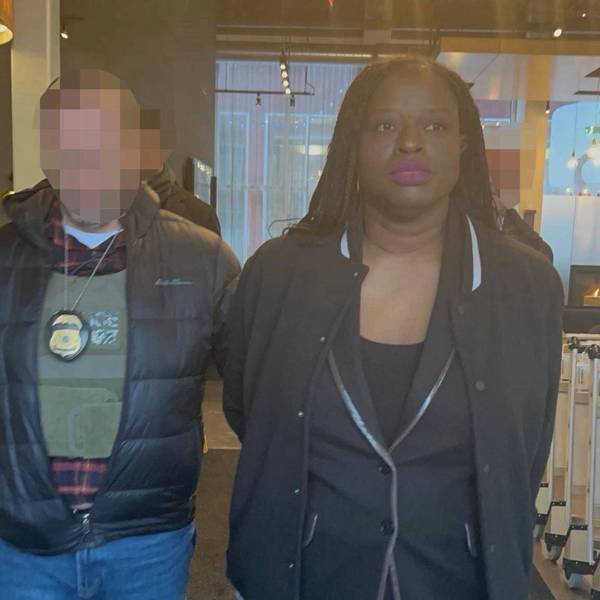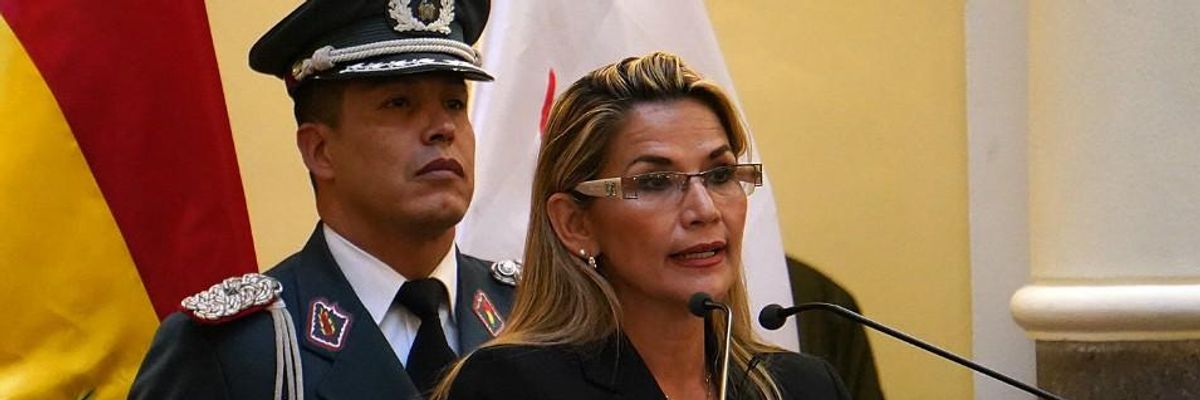Returning to La Paz, Bolivia after last November's coup was like returning to the scene of a crime. Since Bolivian President Evo Morales was removed from power, right-wing interim President Jeanine Anez has led the country with an iron fist.
State repression immediately following the coup left dozens dead and the government has been throwing political enemies behind bars. The Anez administration, now using the pandemic as a pretext for further crackdowns on dissent, is part of a rising right across the Americas.
The fierce conflicts following the October 20 election had left their mark on the city when I visited in March. Intersections were scarred from barricade bonfires. Graffiti across La Paz denounced the "Murderer Anez." A general sense of fear hung in the air. Rumors of government surveillance and political arrests were rampant. Everyday life continued as usual in the downtown traffic and sun, while state violence was meted out in the shadows.
One morning, I took the city's aerial cable car system to El Alto to meet with journalist Julio Mamani. I passed hundreds of miners marching into La Paz from El Alto, their helmets shining in the sun, their yells blending with bus horns. Above, participants in a women's march gathered, wearing green bandanas and denouncing both Morales and Anez for rising feminicides.
President Morales and the Movement Toward Socialism (MAS) party governed the country for 14 years. During that time, the MAS dramatically reduced poverty, used funds from the Bolivia's vast natural resource wealth for popular social programs, and exerted economic and political sovereignty in the face of US imperialism and global capitalism.
Mamani compared the Anez government to past Bolivian dictators. "I was a witness of the 1979 Massacre of Todos Santos of General Busch. Now [state repression] is more sophisticated. They won't hunt you down in the same manner. They use other forms, and in this case, it is intimidation."
"I call it a kind of revenge," he said.
The country arrived at this moment because of the coordinated efforts of the right. But many different elements converged to oust one of the most popular presidents in Bolivian history.
President Morales and the Movement Toward Socialism (MAS) party governed the country for 14 years. During that time, the MAS dramatically reduced poverty, used funds from the Bolivia's vast natural resource wealth for popular social programs, and exerted economic and political sovereignty in the face of US imperialism and global capitalism. The indigenous rural poor benefitted greatly from this political project, and it's from this sector that the MAS enjoyed its base of support.
But in the eyes of Bolivia's racist right, this was a crime. They wanted their power and profits back.
Certain negative actions and policies of the MAS government over these years in power also contributed to its own crisis of legitimacy in the lead up to the October 2019 elections. Critiques from the left and various movements have been levelled against the MAS government for years for the rise in violence against women, the harmful aspects of deepening extractivism, the handling of last year's mass fires in the country, and state corruption and abuses of power.
"To understand what's happening right now in Bolivia, it's key to also understand the process of increased division and degradation that the social movements suffered during the tenure of Evo Morales," Bolivian sociologist and historian Silvia Rivera Cusicanqui wrote in November of last year. "The movements who were initially the president's support base were divided and degraded by a left that would allow only one possibility and wouldn't allow autonomy."
Such critiques and issues accumulated over the years. A breaking point was when Morales ignored the results of a 2016 referendum in which a majority of the population voted against allowing him to run again for president in 2019. In the lead up to the October 20, 2019 election, the MAS and Morales were already mired in a crisis of legitimacy, making them an easier target for the right, which had been consolidating forces and capitalizing off of the errors of the MAS.
Meanwhile, the opposition promoted a narrative about the likelihood of fraud in the weeks leading up to the election. The issue of fraud during the October 20th elections, which indicated Morales won another term, has been widely debated and investigated. Many of the people I spoke with in La Paz in March did not believe "monumental" fraud had been committed by the MAS, as the opposition claimed, but that a "typical" low level of irregularities had taken place. Regardless of the extent or existence of fraud, the Organization of American States strategically threw gasoline on the fire during a critical moment of the October crisis with their early claims of fraud, pushing the country into violence.
Following the election, protesters against Morales allied with right-wing leader Fernando Camacho and other racist figures, fomenting destabilization and violence in the country in an effort to force Morales out of office. These efforts ultimately created the pretext for a police and military intervention in the name of order, which is exactly what happened. On November 8, police across the country mutinied against the government, and the military "suggested" Morales step down on November 10.
Within this climate of violence and threats, Morales and other MAS leaders were forced to flee or go into hiding. Fearing for his life, Morales left the country for Mexico on November 10. The right, having planned for a seizure of the government, took advantage of the power vacuum and entered office with the crucial blessing of the Bolivian armed forces and the US embassy.
The coup would not have been successful without the support of the police, military, and US embassy.
Right-wing Senator Jeanine Anez declared herself president in front of an empty Congress on November 12. She celebrated entering office holding a massive Bible. "The Bible has returned to the government palace," she declared. "My commitment is to return democracy and tranquility to the country." Days later, state repression left over a dozen unarmed protesters and bystanders dead in Senkata and Sacaba, key areas of resistance to the coup regime.
Various elements contributed to the coup, from the MAS's crisis of legitimacy to the resurgence and orchestrations of the Bolivian right. Yet the coup would not have been successful without the support of the police, military, and US embassy.
Following Anez's seizure of power, Bolivia has endured the worst state violence and political persecution it has seen in decades.
"They're criminalizing social protest and social leaders--all of them are under severe investigations," Bolivian journalist Fernando Molina explained to me at a cafe in La Paz. "If they are found to be linked to Evo Morales, they are detained and investigated. This fascist society uses justice so that their lynchings are not so vulgar, but rather more institutional. It's a disaster for human rights."
"There's a 'Bolsonarization' of Bolivia," Molina explained, referring to Brazil's far-right President Bolsonaro. "It's the Latin American version of the alt-right in the US, Trumpism."
The coup and Anez's government empowered this movement. "In general," he said, "I see a right-wing movement, anti-institutional, anti-party, pro-arms, pro-Trump, catholic or evangelicals, as in the case of Anez, also Camacho, the Santa Cruz leader. Anti-gay movements, anti-feminist - those groups are very powerful and they were consolidated by these actions."
The Anez government threatens to roll back major progressive policies of the MAS, as well as victories won in the streets by Bolivia's broad social, labor, and indigenous movements.
"The coup d'etat is not just against the state, the government, but also the social movement organizations," Aymara feminist activist Adriana Guzman explained last November.
"What we lose is the possibility of carrying forward this process of transformation alongside the state," Guzman said. "But we don't lose hope. We don't lose conviction, we don't lose our dreams, we don't lose the urgency of making another world possible. It is much more difficult in a fascistic state, but we will continue to do it."




